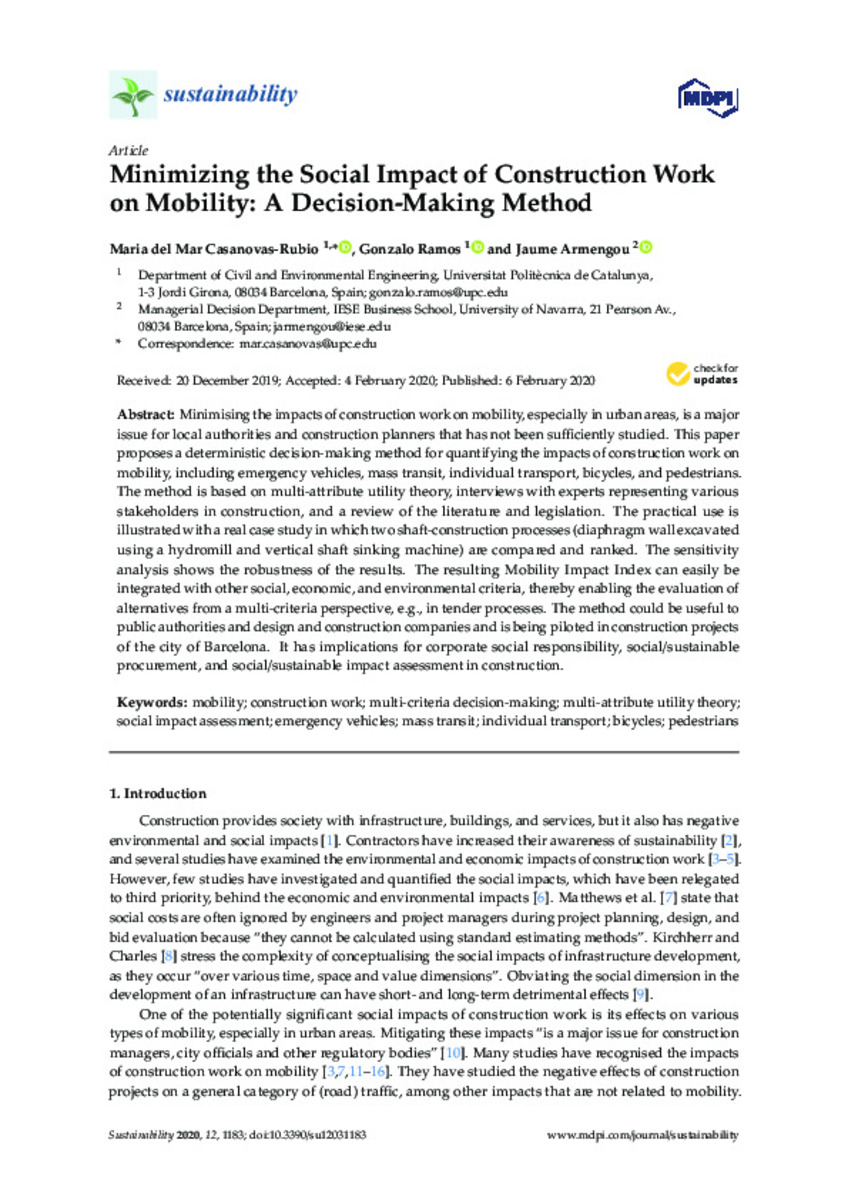Full metadata record
| DC Field | Value | Language |
|---|---|---|
| dc.creator | Casanovas-Rubio, M.M. (María del Mar) | - |
| dc.creator | Ramos, G. (Gonzalo) | - |
| dc.creator | Armengou, J. (Jaume) | - |
| dc.date.accessioned | 2022-02-28T08:38:54Z | - |
| dc.date.available | 2022-02-28T08:38:54Z | - |
| dc.date.issued | 2020-02-06 | - |
| dc.identifier.citation | Casanovas-Rubio, M.d.M.; Ramos, G.; Armengou, J. Minimizing the Social Impact of Construction Work on Mobility: A Decision-Making Method. Sustainability 2020, 12, 1183. https://doi.org/10.3390/su12031183 | es_ES |
| dc.identifier.issn | 2071-1050 | - |
| dc.identifier.uri | https://hdl.handle.net/10171/62962 | - |
| dc.description.abstract | Minimising the impacts of construction work on mobility, especially in urban areas, is a major issue for local authorities and construction planners that has not been sufficiently studied. This paper proposes a deterministic decision-making method for quantifying the impacts of construction work on mobility, including emergency vehicles, mass transit, individual transport, bicycles, and pedestrians. The method is based on multi-attribute utility theory, interviews with experts representing various stakeholders in construction, and a review of the literature and legislation. The practical use is illustrated with a real case study in which two shaft-construction processes (diaphragm wall excavated using a hydromill and vertical shaft sinking machine) are compared and ranked. The sensitivity analysis shows the robustness of the results. The resulting Mobility Impact Index can easily be integrated with other social, economic, and environmental criteria, thereby enabling the evaluation of alternatives from a multi-criteria perspective, e.g., in tender processes. The method could be useful to public authorities and design and construction companies and is being piloted in construction projects of the city of Barcelona. It has implications for corporate social responsibility, social/sustainable procurement, and social/sustainable impact assessment in construction. | es_ES |
| dc.description.sponsorship | This research was funded by the Spanish Ministry of Economy and Competitiveness under grant BES-2008-002621 and by the Spanish Civil Engineer Association. | es_ES |
| dc.language.iso | eng | es_ES |
| dc.publisher | MDPI | es_ES |
| dc.rights | info:eu-repo/semantics/openAccess | es_ES |
| dc.subject | Mobility | es_ES |
| dc.subject | Construction work | es_ES |
| dc.subject | Multi-criteria decision-making | es_ES |
| dc.subject | Multi-attribute utility theory | es_ES |
| dc.subject | Social impact assessment | es_ES |
| dc.subject | Emergency vehicles | es_ES |
| dc.subject | Mass transit | es_ES |
| dc.subject | Individual transport | es_ES |
| dc.subject | Bicycles | es_ES |
| dc.subject | Pedestrians | es_ES |
| dc.title | Minimizing the social impact of construction work on mobility: a decision-making method | es_ES |
| dc.type | info:eu-repo/semantics/article | es_ES |
| dc.publisher.place | Switzerland | es_ES |
| dc.identifier.doi | 10.3390/su12031183 | - |
| dadun.citation.number | 3 | es_ES |
| dadun.citation.publicationName | Sustainability | es_ES |
| dadun.citation.startingPage | 1183 | es_ES |
| dadun.citation.volume | 12 | es_ES |
Files in This Item:
Statistics and impact
Items in Dadun are protected by copyright, with all rights reserved, unless otherwise indicated.






